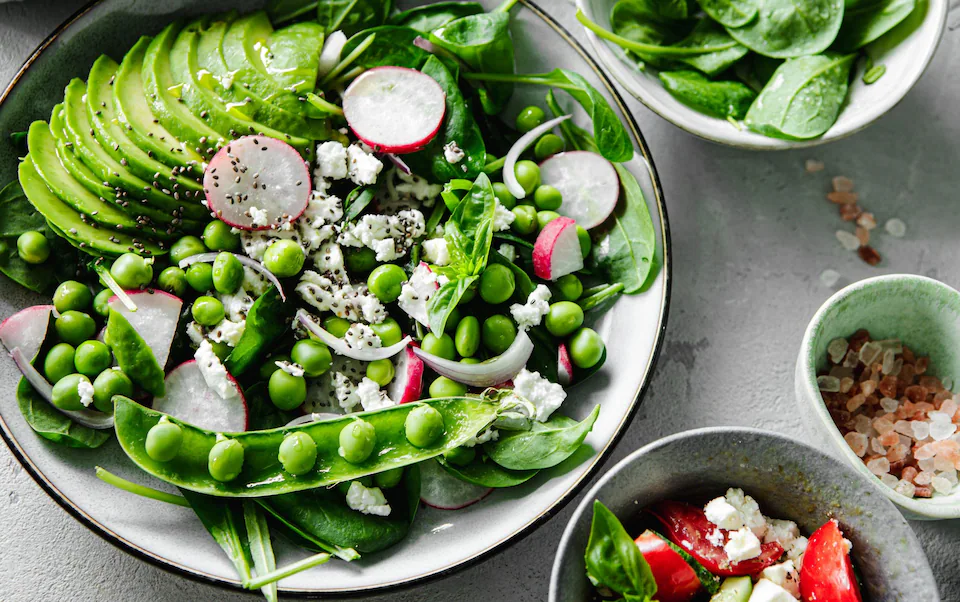Slowing Down Aging with the Green Mediterranean Diet: A Delicious Way to Boost Brain Health
There are days when my accomplishments astound me. On other days, however, I store my keys in the refrigerator. If this sounds like you and you’re nearing middle age, wondering how to keep your memory and brain healthy, you may want to try the green Mediterranean diet.
A modified Mediterranean diet that incorporates green tea and green smoothies may be even more effective than the original in delaying the aging process of the brain, according to research from BGU University in Israel.
Dietitian Laura Clark says, “This research points towards the value of plant chemicals, called polyphenols, in the diet.” These substances, which are found in large quantities in green vegetables, have anti-inflammatory qualities and seem to be some of the most effective in lowering the risk of brain deterioration as we age.
Although a lot of green tea and green smoothies were consumed throughout the experiment, eating a range of green vegetables would have comparable health advantages. The green Mediterranean diet offers a natural way to support your body and brain.
1. Kale Sautéed for Cancer-Preventive Antioxidants
Flavonols, a class of antioxidants found in abundance in kale, help shield cells from harm and lower inflammation. Additionally, it includes plant substances known as glucosinolates, which the stomach transforms into sulforaphane, a substance with anti-cancer qualities.
Try gently sautéing kale since it may be difficult to consume raw. Heat a frying pan and add a shake of red pepper flakes, a clove of finely grated garlic, and a little amount of olive oil. Cook the finely chopped kale until it has barely wilted. Before serving, squeeze in some lemon juice and season with a generous pinch of black pepper.
2. Leeks for Gut-Healthy Prebiotics
Resistant starch, a kind of prebiotic fiber that the stomach is unable to digest, is abundant in leeks. It travels to the large intestine, where the gut microbes digest it to create short-chain fatty acids. These enhance insulin sensitivity and cognitive function and are essential for gut health.
Leeks are my favorite to consume when combined with other nutrient-dense green veggies, like watercress, in a soup. Add a finely sliced leek to a big pot with melted 1 teaspoon butter and cook for a few minutes. After five more minutes of sautéing, add a bag of watercress and a peeled and diced potato. Finally, add 500 ml of vegetable stock and a dash of nutmeg. After 20 minutes of simmering, season thoroughly and mix until smooth.
3. Savoy Cabbage Stir-Fried to Increase Your Intake of Fiber
Typically, when people think about fiber, they picture bowls of cardboard. All Bran for breakfast; however, there are plenty more delicious methods to meet our daily fiber needs (around 30 g). Savoy cabbage, a green Mediterranean diet favorite, contains 3g of fiber per 100g.
To warm up on a chilly evening, I like stir-frying savoy cabbage with a lot of ginger, garlic, and chili. Heat one tablespoon of oil in a big wok, add two finely grated garlic cloves, one teaspoon of freshly grated ginger, and a deseeded and finely chopped red chili. Stir fry for one minute over high heat. Stir-fry the shredded savoy cabbage for three more minutes, or until it just starts to wilt. Before serving, take off the heat and pour some sesame oil over it.
4. For Protein, Use Green Peas in Your Salad
Although we often think of protein as a juicy, fat steak, peas are one of the few green vegetables that are rich in protein and, of course, free of saturated animal fat. For every 100g, they have around 5.5g of lean plant protein. Additionally rich in protein are broad beans and edamame beans.
Blanch 200g of peas, mango, and green beans each in boiling water for a few minutes to soften them, creating a comforting green vegetable salad that’s ideal for winter. Combine the juice of an orange and a lemon, 1 tablespoon of olive oil, ½ teaspoon cumin, and a sprinkling of salt and pepper to make a dressing. While the veggies are still warm, dress them. This recipe is a great addition to the green Mediterranean diet, boosting both protein and flavor.
5. For Healthy Bones, Include Swiss Chard with Your Cereals
The significance of calcium and vitamin D in maintaining healthy bones is well known, but most people are unaware that vitamin K also works in tandem with these nutrients to control calcium deposition in the bones. Your whole daily recommended dose of vitamin K is contained in 100g of Swiss chard.
Heat 1 teaspoon olive oil and 1 teaspoon butter in a skillet to create a simple side dish. Before adding a packet of precooked quinoa, some chopped chard, and a handful of chopped green herbs (parsley, mint, etc.), add the sliced mushrooms and let them soften. Let the greens wilt, then drizzle some lemon juice over them and sprinkle with plenty of black pepper and Parmesan shavings. This dish is an excellent addition to your green Mediterranean diet for strong bones.

